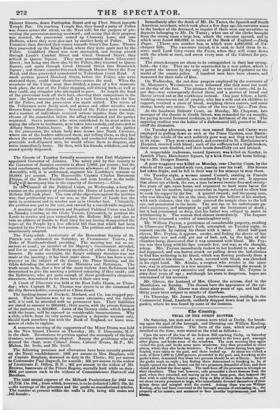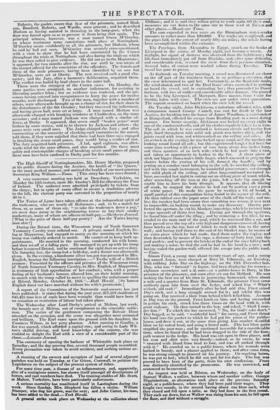Eby Country.
TRIAL OP THE DERBY RIOTERS.
On Saturday, ten men and a woman were tried at Derby, for break- ing open the gaol of the borough, and liberating one William Keeling, a prisoner confined there. The facts of the case, which were partly detailed at the time, were stated on the trial as follows— Upon the news of the loss of the Reform Bill reaching Derby, on Saturday evening the 8th of October last, a mob proceeded to the town gaol, amongst other places, and broke some of the windows. The next morning they again visited the gaol, and broke some more windows: they then proceeded to other places, where they also broke windows. Two of the rioters having, been appre- hended, were taken to the gaol, and there locked up. At about ten o'clock.a mob, of from 1,000 to 1,500 persons, proceeded to the gaol, and, knocking at the gaoler's door, demanded that these two persons should be set at liberty. At first the gaoler made no reply ; but finding them determined on breaking in, he at length opened the door, turned out the two prisoners demanded of him, and then closed and locked the door again. The mob bore off the prisoners in triumph on their shoulders. They had, however, only proceeded a short distance from the gaol, when they returned, and tearing up an iron lamp-post, they battered the door with it until they burst it open; forty Or fifty of them then rushed in, and set about twenty prisoners at large, who immediately divested themselves dadr prison dress and mingled with the crowd. Among these was one William Keeling, who had been convicted at the borough sessions of embezzling 5s.' the property of his master, and sentenced to four months' imprisonment and hard
labour. - •
Roberts, the gaoler, swore that foar of the prisoners, named Hud- son, Bamford, Roberts, and Wardle, were present ; and he described Hudson as having assisted in thrusting in the lamp-post, when the door was forced open so as to prevent it from being shut again. The principal witness, however, was a man named Owen M'Gawley, on whose testimony some convictions took place at Nottingham. M'Gawley swore confidently to all the prisoners, but Hudson, whom he Said he had not seen. M'Gawley- was severely cross-questioned, with a view to show that he had been entertained by the Crown throughout the trials at Nottingham, and also during the trials on which he was then called to give evidence. He did net go to the Magistrates, it appeared, for two months after the riot, nor until he was aware of the reward offered for the conviction of the offenders. The female and three of the male prisoners, having been identified by no one but M'Gawley, were set 'at liberty. The rest received each a good cha- racter; and the Jury, after a moment's deliberation, acquitted them. The verdict was hailed by loud cheers in the outer hall. These were the strongest of the Crown cases. On Monday, the same parties were arraigned, on another indictment, for assisting in liberating another felon ; but no evidence was tendered, and the pri- soners having entered into recognizances to keep the peace for twelve months, were discharged. Two of the men, together with a number of others, were afterwards brought up on a charge of riot, for their share in the disturbances of the 9th October ; but they traversed the indictment, and having given bail, were set at large. A man named Mettatn was afterwards charged with breaking windows at Chaddesden, on the same occasion ; and a man named Jackson was charged with a similar of- fence, at Derby. It appeared, that seven small "leaden panes" were broken by some stones, said to be thrown by Jackson and others : the panes were very small ones. The Judge charged the Jury ; and after commenting on the necessity. of checking such enormities in the outset, told them, if they were satisfied that there had been three men engaged in breaking the seven small panes, they would bring a verdict of riot. The Jury acquitted both prisoners. A. lad, aged eighteen, was after- wards tried for the same offence, and also acquitted. On these most paltry and contemptible charges of breaking seven small panes of glass, these men have been confined in Derby gaol for five months.



























 Previous page
Previous page